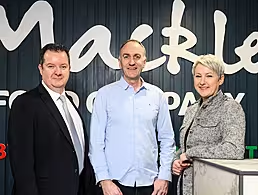Sales is one thing, but a tech sales job can feel very different when it comes to the interview. HubSpot sales manager Andy Stansell has some advice for you.
Working in sales today looks a lot different than it did 10 years ago. Forget the suits and fancy dinners – now, to be successful in sales, you have to be focused on helping your customers, not spamming them with phone calls.
If you use interruptive, old-school sales tactics, your audience will be quick to block your number, delete your email and find a different, more helpful company to buy from.
What’s even more different is that working in sales today really means working in tech. Door-to-door sales is going away, and the idea of outside sales (visiting your prospects in-person) is becoming harder and harder for businesses to do as people shop and buy everything, from shoes to software, online.
It’s a great time to grow your career as a salesperson in Ireland for that reason – tech is booming here and it needs new sales talent every day.
As a sales manager at HubSpot, I interview candidates for sales jobs every week and have seen first-hand what makes a candidate stand out and what are red flags in candidate’s answers. What made someone a great salesperson a few years ago has changed. The best candidates today are hungry to succeed, passionate about helping customers and can point to their successes.
If you’re interviewing for a sales job with a tech company or start-up soon, here is how you can prepare to leave an impression in this new world of selling.
Do your research
Hiring managers and recruiters can tell within just a few seconds who did their homework before an interview and who didn’t. That’s why, to get ahead of other candidates in the interview process, you need to do more than a quick Google search.
I’ve interviewed salespeople who have signed up for a free trial of our software to really understand what it is they’d be selling. That shows me that they’re serious about the job. So, beyond reading a company’s mission statement, some things to consider: have you read any customer case studies? Are there free tools you could sign up for? Did you search for product reviews online? Digging into more resources will make you more prepared and it won’t go unnoticed.
Think of four examples
Top sales candidates have examples in their back pocket that illustrate their successes. For example, when I ask candidates to talk to me about their performance, the best answers are the ones that share actual performance metrics, highlight sales deals they’re proud of or learned from, and walk me through their sales process in depth. Answers like, ‘I had a pretty good quarter’, or, ‘I mostly hit my number each month’, won’t convince hiring managers that you’re a better salesperson than another candidate.
That’s why I recommend having a few tangible examples in mind to show, not tell, your performance and process. Think about times you showed coaching ability, closed (or lost) a hard deal, or won a performance award. Those are stories hiring managers will remember.
Show that you’re goal-oriented
I want to hire competitive people. But it’s not always easy to spot competitiveness in a 30-minute interview. That’s why I look for signs that someone is naturally goal-oriented.
For example, if they’re driven by training for marathons, taking music lessons, or saving for a house or new car, it’s a good indicator that they are constantly pushing themselves. Does that mean you need to find a brand new hobby before your next interview? Of course not, but think about ways to show that you’re hungry to improve, big or small.
If you’re always working toward something, even if that’s planning your next holiday, then you already have that competitive gene that hiring managers are looking for.
Know your customer and your market
Lastly, to really leave an impression on your interviewer, demonstrate that you deeply understand who your audience is. Even if you’re currently working in a completely different industry or in an outside sales environment, hiring managers want to know that you are learning from every deal you work on. What have you learned about your prospects? How has that changed how you qualify prospects?
Especially for companies with global teams, being able to share insights about your customers and your market is a plus. At HubSpot, for example, we’re growing quickly in the Dutch and Nordic regions so the candidates who stand out for those sales roles are the ones who have some experience selling into those markets and can talk about what they’ve learned as a result.
Andy Stansell is a sales manager at HubSpot. He has worked at the company for more than three years.
Updated, 3.03pm, 18 July 2017: An earlier version of this article’s headline incorrectly stated a list containing five rather than four.




